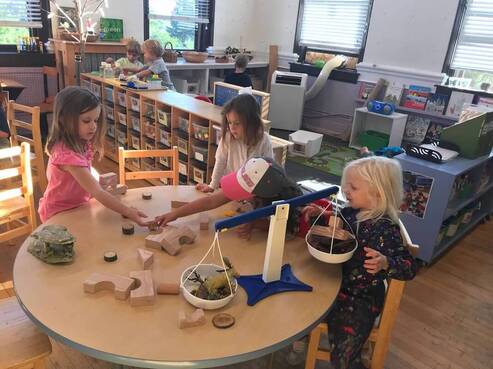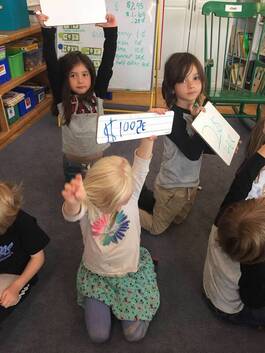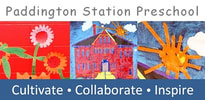
PLAY:
Kindergartners’ play continues to be cooperative and sustained for longer periods of time. They are gaining social maturity, increased organization and problem-solving skills. Kindergartners build solid, intricate block structures together and include stories and plot lines in their play.
Cooperative play is when children play together and actively take part in the same activity.
SOCIAL EMOTIONAL:
Social and emotional development includes independent verbal conflict resolution skills and acting as contributing members of a classroom community. Kindergartners are progressing toward the application of collaborative skills to other domains of learning.
PHYSICAL (Fine Motor and Gross Motor):
Gross Motor: Kindergartners become more confident hopping on two feet, skipping, running, jumping and hopping on one foot.
Fine Motor: Kindergartners master a three-point grip and the use of scissors.
LANGUAGE:
Kindergartners are building their vocabularies, using full sentences and telling stories with a beginning, middle and end. They use descriptive words and their phonemic awareness grows.
COGNITIVE:
Reading, writing and math become the focus through a play-based learning environment. Deep thinking and curiosity is fostered through playful games and fun. Emergent reading and writing skills commence and Kindergartners begin to recognize geometric shapes and patterns.
LITERACY:
Kindergartners practice rhyming through games and songs, use rhyming words to read and create new words, develop phonological awareness by isolating beginning, middle and ending sounds, identify upper case and lowercase letters, know letter sounds, begin reading and using comprehension strategies to decode many new words. Beginning writing skills include: writing their name, combining drawings with labels to tell stories, spelling phonetically and writing beginning and ending sounds.
Kindergartners’ play continues to be cooperative and sustained for longer periods of time. They are gaining social maturity, increased organization and problem-solving skills. Kindergartners build solid, intricate block structures together and include stories and plot lines in their play.
Cooperative play is when children play together and actively take part in the same activity.
SOCIAL EMOTIONAL:
Social and emotional development includes independent verbal conflict resolution skills and acting as contributing members of a classroom community. Kindergartners are progressing toward the application of collaborative skills to other domains of learning.
PHYSICAL (Fine Motor and Gross Motor):
Gross Motor: Kindergartners become more confident hopping on two feet, skipping, running, jumping and hopping on one foot.
Fine Motor: Kindergartners master a three-point grip and the use of scissors.
LANGUAGE:
Kindergartners are building their vocabularies, using full sentences and telling stories with a beginning, middle and end. They use descriptive words and their phonemic awareness grows.
COGNITIVE:
Reading, writing and math become the focus through a play-based learning environment. Deep thinking and curiosity is fostered through playful games and fun. Emergent reading and writing skills commence and Kindergartners begin to recognize geometric shapes and patterns.
LITERACY:
Kindergartners practice rhyming through games and songs, use rhyming words to read and create new words, develop phonological awareness by isolating beginning, middle and ending sounds, identify upper case and lowercase letters, know letter sounds, begin reading and using comprehension strategies to decode many new words. Beginning writing skills include: writing their name, combining drawings with labels to tell stories, spelling phonetically and writing beginning and ending sounds.

MATH:
Kindergartners count using 1:1 correspondence to 20, can identify numbers to 20, compare and identify 2-D and 3-D shapes, measure using a variety of tools and can identify and create patterns.
SCIENCE:
Kindergartners make predictions before conducting experiments, understand properties of objects and materials and can conduct experiments and record the outcomes.
SOCIAL STUDIES:
Kindergartners understand geography of where they live: city, street, state and well as physical properties such as “by the mountains”, “by the ocean”, “in the city”. They gain understanding of people in other locations and cultures through books and classroom studies.
CREATIVE:
Kindergartners are introduced to real artists and they explore those artists’ techniques. For example, they love to splatter paint and throw sponges filled with paint at a wall covered with paper, like Jackson Pollock. They begin making representational drawings that adults can understand.
ENGLISH LANGUAGE ACQUISITION:
Kindergartners understand complex English questions and instructions, use past and future tense and are able to express thoughts and understanding. Kindergartners can answer questions with more detail and explanation.
MATH:
Kindergartners count using 1:1 correspondence to 20, can identify numbers to 20, compare and identify 2-D and 3-D shapes, measure using a variety of tools and can identify and create patterns.
SCIENCE:
Kindergartners make predictions before conducting experiments, understand properties of objects and materials and can conduct experiments and record the outcomes.
SOCIAL STUDIES:
Kindergartners understand geography of where they live: city, street, state and well as physical properties such as “by the mountains”, “by the ocean”, “in the city”. They gain understanding of people in other locations and cultures through books and classroom studies.
CREATIVE:
Kindergartners are introduced to real artists and they explore those artists’ techniques. For example, they love to splatter paint and throw sponges filled with paint at a wall covered with paper, like Jackson Pollock. They begin making representational drawings that adults can understand.
ENGLISH LANGUAGE ACQUISITION:
Kindergartners understand complex English questions and instructions, use past and future tense and are able to express thoughts and understanding. Kindergartners can answer questions with more detail and explanation.
